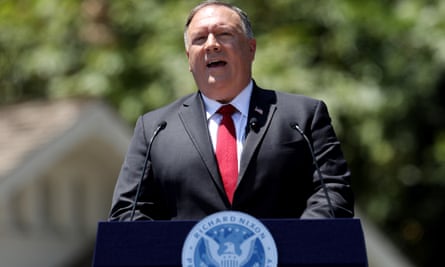'These are his people': inside the elite border patrol unit Trump sent to Portland
Bortac, a quasi-militarised outfit equivalent to the Navy Seals, has been deployed in Iraq and Afghanistan
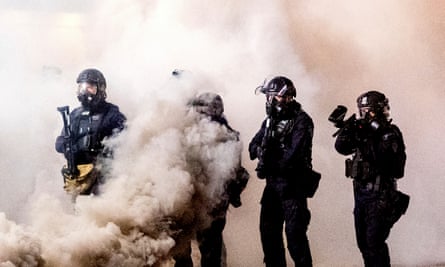 Federal officers use chemical irritants and projectiles to disperse Black Lives Matter protesters on 24 July 2020, in Portland. Photograph: Noah Berger/AP
Federal officers use chemical irritants and projectiles to disperse Black Lives Matter protesters on 24 July 2020, in Portland. Photograph: Noah Berger/APPublished onMon 27 Jul 2020 05.00 EDT
In January 2011, James Tomsheck, then a top internal affairs investigator inside US Customs and Border Protection, attended a meeting of about 100 senior CBP leaders in a hotel in Irvington, Virginia.
Amid the sanitized splendor of the hotel ballroom, he vividly recalls hearing the nation’s then highest-ranking border patrol agent, David Aguilar, laying out his vision for the future. Border patrol, the former CBP deputy commissioner said, was to become the “marine corps of the US federal law enforcement community”.
Another leading CBP figure remarked that border agents were not required to adhere to the same constitutional restraints on the use of force as other law enforcers. “We are not cops,” he said.
Fast forward to this month, when Tomsheck absorbed with mounting foreboding the images of federal officers – led by border patrol agents – wielding teargas and flash bangs against protesters in Portland, Oregon.
As news circulated of demonstrators being shot in the face with “less lethal” munitions, and of unidentified masked agents in camouflage strong-arming civilians into unmarked vans, the nightmare scenario Tomsheck had heard expressed by his bosses almost a decade ago – of border patrol becoming a nationwide militarized force operating outside constitutional constraints – was becoming real.
“Border patrol has always seen itself as a militarized force, and that aspiration is now being enabled by the current administration,” Tomsheck told the Guardian.
On Thursday, Trump ramped up his threat to send border patrol agents into US cities to tackle what he claims is an epidemic of violence and anarchy sweeping urban areas. He told Fox News he was prepared to send in 75,000 federal officers, warning: “We’ll go into all of the cities, any of the cities. We’re ready.”
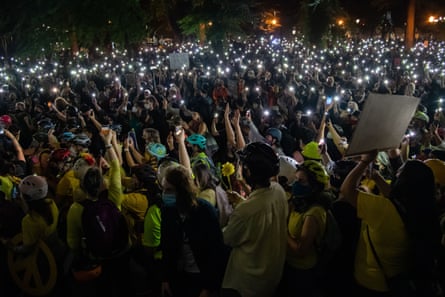
Trump has made what he depicts as crime-ridden inner cities under the control of incompetent Democratic mayors a running theme of his hyper-partisan presidency since its inception. He famously invoked “American carnage” in his 2017 inauguration speech.
By dispatching federal agents to Portland, and potentially rolling out the exercise to other cities such as Chicago, New York and Albuquerque, the US president has turned his dystopian oratory into political reality.
That he should have selected the US border patrol as the lead agency in his new reality-TV bid to seize control of civilian streets is especially alarming to those who are familiar with the agency’s track record. The most comprehensive tally of its fatal abuses, recorded by the Southern Border Community Coalition, has found at least 111 people have died as the result of an encounter with a border agent since 2010.
Tomsheck investigated numerous cases of what he concluded to be inappropriate use of lethal force resulting in needless death during his time at CBP internal affairs from 2006 to 2014. “Time and time again I saw incidents unfold where people – always Latinos, almost always Mexican citizens – lost their lives at the hands of border patrol agents.”
In the same period, the Bush administration drastically expanded the border patrol, almost doubling the number of agents to its current 20,000 and boosting its budget from $1.5bn in 2006 towards the $5bn it is today. The CBP now prides itself at being what it calls “one of the world’s largest law enforcement organizations”.
While the size and scope of the agency has mushroomed, its accountability has lagged behind. Daniel Martinez, a sociologist at the University of Arizona, analyzed the how abuse complaints are handled and found that the body acts with relative impunity.
His research led him to the conclusion there is “a culture of cruelty towards migrants and border crossers that dehumanizes and demeans border crossers. So to see border agents who have already been desensitized by the mistreatment of immigrants redirected to engaging with protesters in the interior is very concerning.”
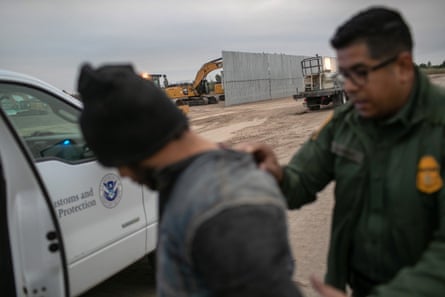
More concerning still is that the federal officers deployed in Portland, ostensibly to protect federal property, were spearheaded by an elite unit, the border patrol tactical unit. Better known as Bortac, it is a quasi-militarised outfit equivalent to the Navy Seals.
Todd Miller, the author of Empire of Borders, has dubbed Bortac as “the robocops of US border patrol”.
Operating largely in secret, Bortac agents are trained for Swat-style raids on organized gangs smuggling immigrants or drugs across the US border. They have been deployed in Iraq and Afghanistan, as well as in many Latin American countries.
Their frontline role in Portland was controversial because they have no apparent training in crowd control or the policing of protests. It built upon the Trump administration’s decision in February to dispatch Bortac into the US interior to work alongside Ice immigration officers in apprehending undocumented immigrants in Democratically-controlled “sanctuary cities”.
Jenn Budd spent six years working as a senior border patrol agent until 2001 when she blew the whistle on a station chief who was himself smuggling drugs. She was offered promotion in exchange for her silence on the subject, but resigned in disgust.
In her years as an agent she got to know Bortac well. She remembers them as the “biggest guys, like the jocks in a football team. They live in tight groups like the Navy Seals, spending their time in military-style training.”
In Budd’s experience, Bortac agents are among “the most violent and racist in all law enforcement”.
The quasi-military nature of the unit goes beyond their training, percolating into their state of mind. “They don’t exist within the realm of civilian law enforcement,” Budd said. “They view people they encounter in the military sense as enemy combatants, meaning they have virtually no rights.”
That strain of extra-judicial aggression runs through everything Bortac does, Budd said. “They don’t do normal vehicle stops. They will rip drivers from their seat, throw him against the side, put him in handcuffs – the same tactics you are now seeing Bortac agents use in Portland.”
Under the rules of the border patrol they are allowed to operate within 100 miles of any US border, including those with Mexico and Canada as well as both coasts. As a result, their writ covers almost two-thirds of the population of the country – some 200 million people – and embraces nine of the nation’s 10 largest cities, many of which Trump is now targeting.
Inside the 100-mile zone, border patrol agents are to some degree free of constitutional restraints that apply to other law enforcers. “They can set up checkpoints up to 100 miles from the border, as they have at Gila Bend and Casa Grande in Arizona,” Tod Miller said. “They consciously operate as though they were above the fourth amendment prohibitions on unreasonable search and seizures, though civil rights groups fiercely contest that.”
Two other aspects of the culture of border patrol are relevant to the current furor over their mobilization in inner cities. Racism and Donald Trump.
Racism has plagued the institution for decades. Jenn Budd recalled that when she signed up for service in 1995 her Spanish instructor blithely informed her that Latino migrants were referenced within the agency as “tonks” and “wetbacks”.
“There’s a prevailing view that all migrants are criminals, and that if you stop someone in their vehicle who looks Latino and speaks Spanish, they are probably criminal too,” she said.
Last year ProPublica exposed a secret Facebook group for current and former border patrol agents whose posts were riddled with violent, racist and sexist language including jokes about migrant deaths. One of the posts exhorted agents to throw a “burrito at these bitches”, referring to Democratic congresswomen calling for an investigation of border facility abuses.
The Intercept went on to reveal that both the current chief of border patrol, Rodney Scott, and his predecessor Carla Provost, were among the group’s almost 9,500 members – almost half the entire force.
While the Facebook group was hidden from public view, there has been no attempt to obscure the passionate, almost obsessive, support that border patrol offers Trump. In March 2016 the then Republican presidential candidate received a boost to his bid for his party’s nomination when the union representing border patrol agents endorsed him.
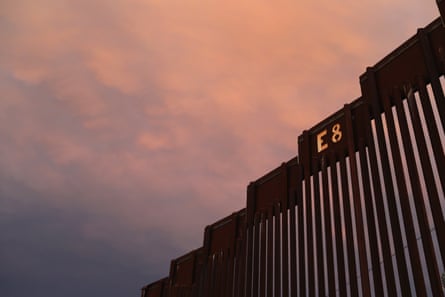
Since then, the relationship has grown ever tighter. Border patrol has enthusiastically followed Trump’s executive orders, even when they mired the agency deep in controversy such as when its agents removed infants from their mothers’ arms under Trump’s 2018 policy of family separation.
The National Border Patrol Council, the agents’ union, is in lock-step with Trump. Of the top 20 posts on its Twitter feed, all but three are retweets of Trump’s personal or campaign messages.
In a video statement embedded on the feed, the union’s president, Brandon Judd, declares that “President Trump is the right candidate for the safety and security of this great nation, not Joe Biden. Please join me in supporting President Trump.”
The Trump-border patrol partnership bears all the hallmarks of a classic quid pro quo. On one side of the deal, the border patrol union lavishes praise on the president and supports his pitch for re-election.
On his side, Trump has repeatedly pushed for more resources for the agency and for its staff union, and is now actively promoting the fulfillment of its dream of becoming a militarized presence on America’s streets. Under his presidency, the brutalized and violent politics of the border are being extended across the nation.
“Trump has ratcheted up political ties to border patrol to another level,” Miller said. “He based his whole 2016 campaign around this, and it is now at the core of his 2020 re-election bid. These are his people.”


